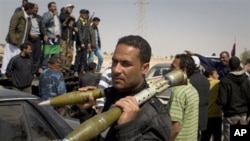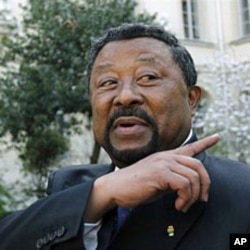A conference of world powers is calling for a democratic transition period in Libya leading to elections that could spell an end to Moammar Gadhafi’s 41-year rule.
The meeting drew representatives of United Nations Secretary-General Ban Ki-moon, the five permanent members of the U.N. Security Council, the African Union, the Arab League, the Organization of Islamic Conference, the European Union, India and Brazil.
A communiqué issued at the end of the day-long session calls on Libya’s warring parties to work together to establish a transition period leading to election of democratic institutions. African Union Peace and Security Commissioner Ramtane Lamamra says it will be up to Libyans to iron out details.
"The parties will have to discuss it to agree on the length, the nature, the tasks of the transition and the way it will be organized, who will be sitting there, what bodies will be in charge of the transition. It’s quite clear," said Lamamra.
The Addis Ababa conference was convened partly to allow the African Union to take a lead role in settling the Libyan crisis. AU diplomats were miffed when the United Nations imposed a no-fly zone preventing a team of five African heads of state from embarking on a mediation mission Tripoli and the rebel stronghold Benghazi.
AU Commission Chairman Jean Ping invited both the Gadhafi government and the rebels to Addis Ababa to Friday’s world powers conference. A five member government delegation arrived, but was barred from the meeting when the rebel group declined to attend.
After the conference, the Libyan delegation met representatives of the African heads of state panel, and issued a statement saying Gadhafi accepts the AU roadmap for ending the conflict. But Abdulati al-Obeidi, Libya’s assistant foreign minister for European Affairs said their main point is a demand for an end to air attacks by a western-led military coalition.
"Cease fire. Stop the air raids from the Atlantic forces. Give us time to meet as Libyans and negotiate future reform," he said.
The minister insisted the panel of five African heads of state would soon embark on their mediation mission to Tripoli and Benghazi.
Western diplomats, however, say the no-fly zone will remain in effect over Libya, and a cessation of military action would depend on whether pro-Gadhafi forces stand down.
Stephane Gompertz, head of the Africa Division of the French Foreign Ministry says the call by world powers for a democratic transition is not necessarily aimed at forcing Gadhafi from power.
"This was not the aim of the meeting, and this is not what we are precisely looking for. If Gadhafi is ousted, that’s fine with us. That’s up to the Libyan people to decide. What we have discussed is how best we can try to secure a cessation of violence and protection of inhabitants," he said.
In his opening address to the world powers conference Friday, African Union Commission Chairman Jean Ping called for an urgent switch from the military to the political track in line with the AU road map.
Western diplomats, however, are said to be leery of the African heads of states mediation effort. They note that Moammar Gadhafi remains one of the Africa’s most formidable leaders, with friends among the leaders on the panel. He is also as one of the African Union’s most generous benefactors.
Analysts estimate Gadhafi contributes $40 million a year to AU coffers, including Libya’s annual dues, which constitute nearly 15 percent of all member state contributions.















